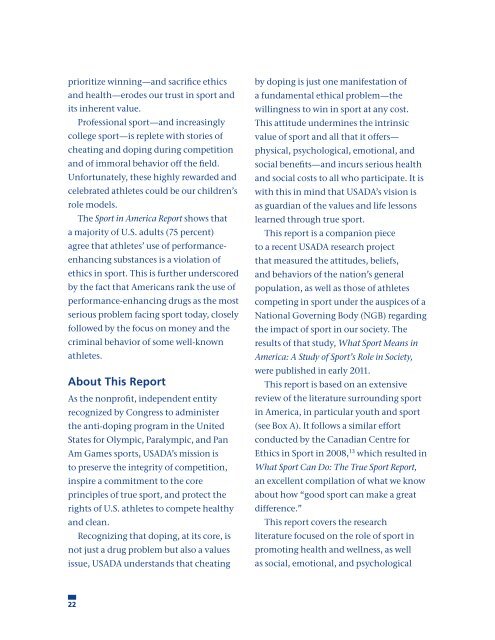True-Sport-Report
Create successful ePaper yourself
Turn your PDF publications into a flip-book with our unique Google optimized e-Paper software.
prioritize winning—and sacrifice ethics<br />
and health—erodes our trust in sport and<br />
its inherent value.<br />
Professional sport—and increasingly<br />
college sport—is replete with stories of<br />
cheating and doping during competition<br />
and of immoral behavior off the field.<br />
Unfortunately, these highly rewarded and<br />
celebrated athletes could be our children’s<br />
role models.<br />
The <strong>Sport</strong> in America <strong>Report</strong> shows that<br />
a majority of U.S. adults (75 percent)<br />
agree that athletes’ use of performanceenhancing<br />
substances is a violation of<br />
ethics in sport. This is further underscored<br />
by the fact that Americans rank the use of<br />
performance-enhancing drugs as the most<br />
serious problem facing sport today, closely<br />
followed by the focus on money and the<br />
criminal behavior of some well-known<br />
athletes.<br />
About This <strong>Report</strong><br />
As the nonprofit, independent entity<br />
recognized by Congress to administer<br />
the anti-doping program in the United<br />
States for Olympic, Paralympic, and Pan<br />
Am Games sports, USADA’s mission is<br />
to preserve the integrity of competition,<br />
inspire a commitment to the core<br />
principles of true sport, and protect the<br />
rights of U.S. athletes to compete healthy<br />
and clean.<br />
Recognizing that doping, at its core, is<br />
not just a drug problem but also a values<br />
issue, USADA understands that cheating<br />
by doping is just one manifestation of<br />
a fundamental ethical problem—the<br />
willingness to win in sport at any cost.<br />
This attitude undermines the intrinsic<br />
value of sport and all that it offers—<br />
physical, psychological, emotional, and<br />
social benefits—and incurs serious health<br />
and social costs to all who participate. It is<br />
with this in mind that USADA’s vision is<br />
as guardian of the values and life lessons<br />
learned through true sport.<br />
This report is a companion piece<br />
to a recent USADA research project<br />
that measured the attitudes, beliefs,<br />
and behaviors of the nation’s general<br />
population, as well as those of athletes<br />
competing in sport under the auspices of a<br />
National Governing Body (NGB) regarding<br />
the impact of sport in our society. The<br />
results of that study, What <strong>Sport</strong> Means in<br />
America: A Study of <strong>Sport</strong>’s Role in Society,<br />
were published in early 2011.<br />
This report is based on an extensive<br />
review of the literature surrounding sport<br />
in America, in particular youth and sport<br />
(see Box A). It follows a similar effort<br />
conducted by the Canadian Centre for<br />
Ethics in <strong>Sport</strong> in 2008, 13 which resulted in<br />
What <strong>Sport</strong> Can Do: The <strong>True</strong> <strong>Sport</strong> <strong>Report</strong>,<br />
an excellent compilation of what we know<br />
about how “good sport can make a great<br />
difference.”<br />
This report covers the research<br />
literature focused on the role of sport in<br />
promoting health and wellness, as well<br />
as social, emotional, and psychological<br />
22


